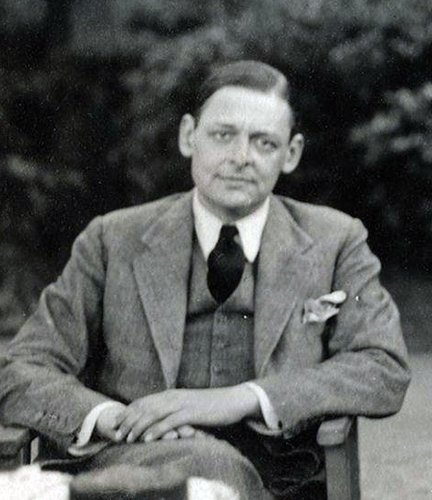Thomas Stearns Eliot słynne cytaty
Źródło: Jake Page, Jak koty widzą świat i ludzi?, tłum. A. Nowicki, wyd. Bellona, Warszawa 2010, s. 23.
„Tylko ci, którzy ryzykują pójście za daleko dowiedzą się jak daleko można dojść.”
Only those who will risk going too far can possibly find out how far one can go. (ang.)
Thomas Stearns Eliot Cytaty o czasie
„W minucie znajdzie się czas,
By postanowić i sprostować
To, co minuta odmieni.”
In a minute there is time
For decisions and revisions which a minute will reverse. (ang.)
Źródło: Prufrock and Other Observations [w:] Wybór poezji, tłum. W. Dulęba, Wrocław 1990, s. 5.
Źródło: Spalony Norton
Thomas Stearns Eliot cytaty
„I tak właśnie kończy się świat. Nie hukiem a skomleniem.”
Źródło: Wydrążeni ludzie
The Wasteland, Prufrock and Other Poems
I have seen the moment of my greatness flicker,
And I have seen the eternal Footman hold my coat, and snicker
And in short, I was afraid. (ang.)
Źródło: Prufrock and Other Observations [w:] Wybór poezji, tłum. W. Dulęba, Wrocław 1990, s. 7.
Źródło: Melania Sobańska-Bondaruk, Stanisław Bogusław Lenard (oprac.), Wiek XX w źródłach, Wydawnictwo Naukowe PWN, Warszawa 2002, ISBN 8301127104, s. 244.
Thomas Stearns Eliot: Cytaty po angielsku
Wariant: The awful daring of a moment's surrender
Which an age of prudence can never retract
By this, and this only, we have existed
Źródło: The Waste Land (1922)
Źródło: The Love Song of J. Alfred Prufrock and Other Poems
“I am glad you have a Cat, but I do not believe it is So remarkable a cat as My Cat.”
Letter to his godson, Thomas Erle Faber (January 1931) as quoted in "T.S. Eliot's Private Letters To Faber Publishing Family To Be Sold" at World Collector's Net http://www.worldcollectorsnet.com/news/newstories/news736.html (12 August 2005)
Źródło: Four Quartets
Kontekst: I am glad you have a Cat, but I do not believe it is So remarkable a cat as My Cat. My Cat is a Lilliecat Hubvously. What a lilliecat it is. There never was such a Lilliecat. Its Name is JELLYORUM and its one Idea is to be Usefull!!
Tradition and the Individual Talent (1919)
Źródło: Four Quartets
Kontekst: The historical sense involves a perception, not only of the pastness of the past, but of its presence; the historical sense compels a man to write not merely with his own generation in his bones, but with a feeling that the whole of the literature of Europe from Homer and within it the whole of the literature of his own country has a simultaneous existence and composes a simultaneous order. This historical sense, which is a sense of the timeless as well as of the temporal and of the timeless and of the temporal together, is what makes a writer traditional. And it is at the same time what makes a writer most acutely conscious of his place in time, of his contemporaneity.
“It is impossible to say just what I mean!”
The Love Song of J. Alfred Prufrock (1915)
Źródło: The Love Song of J. Alfred Prufrock and Other Poems
Kontekst: It is impossible to say just what I mean!
But as if a magic lantern threw the nerves in patterns on a screen:
Would it have been worth while If one, settling a
Pillow or throwing off a shawl,
And turning toward the window, should say:
"That is not it at all,
That is not what I meant, at all."
“Winter kept us warm, covering
Earth in forgetful snow”
Źródło: The Waste Land
The Love Song of J. Alfred Prufrock (1915)
Źródło: Selected Poems
“Shall I part my hair behind? Do I dare to eat a peach?”
Źródło: The Love Song of J. Alfred Prufrock and Other Poems
Ash-Wednesday (1930)
“I think we are in rats’ alley
Where the dead men lost their bones.”
Źródło: The Waste Land
“The last temptation is the greatest treason: To do the right deed for the wrong reason.”
Wariant: The last act is the greatest treason. To do the right deed for the wrong reason.
Źródło: Murder in the Cathedral
